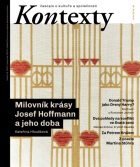
POKORNÝ, P. & KONOPÁSEK, Z. (2020): Lítáme v tom - II.: Dialog o klimatu na pomezí vědy, politiky a aktivismu. Kontexty, 12 (6): 15-24 (přetištěná druhá část textu, který byl napsán pro sborník Musí být ekologie alarmistická?)
::::Pokračování. Paleoekolog Pokorný a sociolog Konopásek, jinak blízcí akademičtí kolegové, rozmlouvají o některých obecnějších souvislostech vědeckého pochybování nad současnou klimatickou politikou. Začínají u rozpaků přírodovědce nad tím, co si počít s ostře odmítavými až útočnými reakcemi širší veřejnosti vůči prezentaci odborného mínění, které jednoduše nezapadá do současného populárního kánonu. Tyto reakce nemají typicky charakter věcné disputace, ale dotýkají se přímo a výslovně osobní integrity, morálky a politického přesvědčení. Patří tohle do vědy? A pokud ano, tak jak? Co si má badatel s tímto rozměrem veřejné debaty počít? Paleoekolog se s takovými otázkami obrací na sociologa vědy, u kterého tuší nalézt porozumění. Sociolog se snaží naznačit komplikované rozhraní mezi vědeckým a politickým, jakož i choulostivost vztahů mezi odborným odstupem od věci a angažovaným ponorem do ní. Čerpá přitom nejen ze specifických zkušeností sociologa vědy, ale často dává na první pohled odtažité příklady z šířeji pojaté oblasti sociálních věd.

POKORNÝ, P. & KONOPÁSEK, Z. (2020): Lítáme v tom - I.: Dialog o klimatu na pomezí vědy, politiky a aktivismu. Kontexty, 12 (5): 30-39 (přetištěná první část textu, který byl napsán pro sborník Musí být ekologie alarmistická?). Dostupné na adrese https://casopiskontexty.cz/litame-v-tom-i/
::::První část. Paleoekolog Pokorný a sociolog Konopásek, jinak blízcí akademičtí kolegové, rozmlouvají o některých obecnějších souvislostech vědeckého pochybování nad současnou klimatickou politikou. Začínají u rozpaků přírodovědce nad tím, co si počít s ostře odmítavými až útočnými reakcemi širší veřejnosti vůči prezentaci odborného mínění, které jednoduše nezapadá do současného populárního kánonu. Tyto reakce nemají typicky charakter věcné disputace, ale dotýkají se přímo a výslovně osobní integrity, morálky a politického přesvědčení. Patří tohle do vědy? A pokud ano, tak jak? Co si má badatel s tímto rozměrem veřejné debaty počít? Paleoekolog se s takovými otázkami obrací na sociologa vědy, u kterého tuší nalézt porozumění. Sociolog se snaží naznačit komplikované rozhraní mezi vědeckým a politickým, jakož i choulostivost vztahů mezi odborným odstupem od věci a angažovaným ponorem do ní. Čerpá přitom nejen ze specifických zkušeností sociologa vědy, ale často dává na první pohled odtažité příklady z šířeji pojaté oblasti sociálních věd.
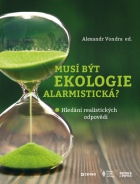
POKORNÝ, P. & KONOPÁSEK, Z. (2020): Lítáme v tom: Dialog o klimatu na pomezí vědy, politiky a aktivismu. In: A. Vondra, ed: Musí být ekologie alarmistická? Hledání realistických odpovědí. Brno: Books & Pipes. Str. 67-105
::::Paleoekolog Pokorný a sociolog Konopásek, jinak blízcí akademičtí kolegové, rozmlouvají o některých obecnějších souvislostech vědeckého pochybování nad současnou klimatickou politikou. Začínají u rozpaků přírodovědce nad tím, co si počít s ostře odmítavými až útočnými reakcemi širší veřejnosti vůči prezentaci odborného mínění, které jednoduše nezapadá do současného populárního kánonu. Tyto reakce nemají typicky charakter věcné disputace, ale dotýkají se přímo a výslovně osobní integrity, morálky a politického přesvědčení. Patří tohle do vědy? A pokud ano, tak jak? Co si má badatel s tímto rozměrem veřejné debaty počít? Paleoekolog se s takovými otázkami obrací na sociologa vědy, u kterého tuší nalézt porozumění. Sociolog se snaží naznačit komplikované rozhraní mezi vědeckým a politickým, jakož i choulostivost vztahů mezi odborným odstupem od věci a angažovaným ponorem do ní. Čerpá přitom nejen ze specifických zkušeností sociologa vědy, ale často dává na první pohled odtažité příklady z šířeji pojaté oblasti sociálních věd.

KONOPÁSEK, Z. (2020): Latour o antropocénu: Složité vztahy mezi intelektuálním a politickým radikalismem. Vesmír , 99 (150): 512-514
, 99 (150): 512-514
::::Bruno Latour patří mezi nejcitovanější autory v sociálních vědách. Renomé
získával především jako sociolog vědy, nikdy se ale nebránil přesahům do
ostatních oborů. Napsal řadu empiricky podložených studií – o laboratorních
vědeckých praktikách, o technologických inovacích, o fungování správního
soudu nebo o Luisi Pasteurovi a jeho době. V posledních letech na
sebe upozorňuje tím, že promlouvá o antropocénu (někdy píše o „novém
klimatickém režimu“). Pozoruhodné je, že jeho obrat k novému
tématu je často spojován s údajným obrácením názorovým. V tomto textu se toto obrácení, jakož i jeho obecnější souvislosti, kriticky rozebírám.

KONOPÁSEK, Z. / SONERYD, L. / SVAČINA, K. (2018): Lost in translation: Czech dialogues by Swedish design. Science & Technology Studies, 31 (3): 5-23
::::This study explores the journey of a model for stakeholder involvement called RISCOM. Originally developed within the field of radioactive waste management in Sweden, it was later used in the Czech Republic to re-establish public dialogue in the process of siting a geological repository. This case offers an opportunity to empirically study the fragility and ambiguous results of organized spread of public involvement across various domains of technological innovation and national contexts. We show how three circumstances – (1) the ambition to make RISCOM an internationally used model for public dialogue, (2) the specific situation in the Czech siting process, and (3) the short-lived and limited success of the subsequent Czech dialogues by Swedish design – were intrinsically related and sustained each other. Better understanding of such complexities might contribute to a more realistic attitude toward technologized democracy, i.e., toward practices of public deliberation increasingly becoming instrumental, transferable, and depoliticized.
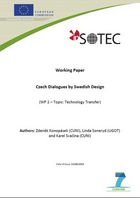
KONOPÁSEK, Z. / SONERYD, L. & SVAČINA, K. (2014): Czech Dialogues by Swedish Design. Working paper of the InSOTEC project (WP 2). Available at http://www.insotec.eu/publications/topical-reports
::::Transferring an elaborate design to a different setting is always an intricate business with uncertain results. This report takes this well-known lesson as a starting point for a study of the travel of a ready-made design for public dialogue on geological disposal. We want to discuss how established participative procedures are made to travel from one national context to another under the auspices of the EU and what the limits and consequences of such transfers are. The interesting thing for us is not only how the target setting is changed or not by the newly introduced practices, but also how the relatively well established participatory “technology” is itself being transformed during its transmission and implementation. Successes and failures of such a transfer have to be seen and assessed against the background of these mutual accommodations, translations and betrayals. Thus, our general interest is the fragility and ambiguous results of intentional and systematic spread of technical democracy across national and political contexts. More precisely, we will follow and critically discuss the story of how a Swedish design for public dialogues called RISCOM was transferred to the Czech Republic. We are going to show that, on the one hand, RISCOM made an important achievement in the Czech case, since it helped to bring all the main actors to a discussion table after previous negotiations had completely crashed. On the other hand, however, it seems that RISCOM substantially failed from a broader perspective. It found its way in the Czech Republic only at the cost of losing its specific original characteristics (and emphasizing new ones, rather controversial). As such, it quickly became associated with only too general appeals to dialogue, the attractiveness of which lived but shortly. It contributed to the increasing focus on dialogue per se, which ultimately led to frustration and impatience on both sides. This recently resulted in the shift toward more authoritative decision making in the Czech Republic and another crisis of mutual trust.
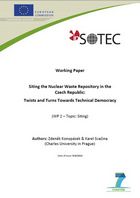
KONOPÁSEK, Z. & SVAČINA, K. (2014): Siting the Nuclear Waste Repository in the Czech Republic: Twists and Turns Towards Technical Democracy. Working paper of the InSOTEC project (WP 2). Available at http://www.insotec.eu/publications/topical-reports
::::We are going to present a story of a double turn: first, the turn toward deliberative procedures orchestrated by the implementer; this turn came after the initial period of expert driven decision making had led to public protests and failed. Second, we describe a turn back toward more authoritative and technocratic decision making after several-years long attempt at “technical democracy”, to use this famous term (Callon, Lascoumes & Barthe 2009), did not bring expected results quickly enough. While the former kind of turn appears relatively frequently in literature, often accompanied by an account of how subsequent deliberation brought about interesting results, the latter does not seem to be discussed too often – although similar failures may not be so rare. This could be related, among others, to the fact, that while the first kind of events documents the need to take “social aspects” of technology into account (and, eventually, an important role of social learning), telling about failing attempts at carefully orchestrated public dialogue (under the auspices of EU projects) complicates the point – which is what we would deliberately like to do in this case study; and by doing so we hope to join the discussion about the limits of participation and about how to “move beyond mere sloganizing over science and democracy”. We want to show that a misunderstanding about the meaning of the notion of “socio-technical” can be seen behind the described double turn. Socio-technical, at least as far as its STS origin implies, does not mean simply just adding a list of “social issues” to the technical agenda. Not in a way in which the two sets of aspects are kept apart, separated and hierarchically ordered as two different kinds of issues to be solved in different spaces and times. And not in a way which is simply based on gathering experts and lay people together so that they may speak to each other and therefore constitute a kind of “socio-technical” discourse. Instead (and in accordance to the work done within STS), the notion of socio-technical refers to analytical determination to approach and understand social and technical processes together, as a single network, i.e., going hand in hand, inseparably (i.e., Callon 1991; Latour 1991 and elsewhere). Something like this, of course, is hard to translate into policy practices and formalized public involvement – which is valid even more for policy cultures that have remained practically untouched by “the emerging interest in scientific citizenship today and multiple new forms of public participation in science and technology” and in which scientific expertise still very much enjoys the status of politically neutral authority, external to societal life. In a way, we are convinced that the siting process in the Czech Republic has fallen victim to the simplified understanding of what “socio-technical” means for technical democracy in the making.
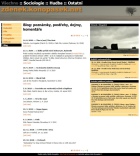
KONOPÁSEK, Z. (2013): Sociologie, na které ne/záleží. Blog Zdeňka Konopáska, 24. 3. 2013. Dostupné na adrese http://zdenek.konopasek.net/index.php?m=16&b=16&i=2757
::::Nezávazný, lehkonohý vztah k teoriím tedy vede k tomu, že si jako sociologové zvykáme na nespoutané žvanění. Co nedovolí jedna myšlenková tradice, dovolí jiná. Přepnutí je bezbolestné. A je-li to ve jménu angažovanosti a v zájmu oslovení širokého publika, platí to dvojnásob. Vykecáme se ze všeho. Ze slov, co říkáme či neříkáme, se svět nezboří. Je to přece jenom sociologie, ne?... Líp už cestu k bezvýznamnosti a vyprázdnění vlastního oboru dláždit nemůžeme.

KONOPÁSEK, Z. (2013): Simulakrum jako nadávka? Blog Zdeňka Konopáska, 29. 1. 2013. Dostupné na adrese http://zdenek.konopasek.net/index.php?m=16&b=16&i=2728
::::Bělohradskému se opět podařilo vyprovokovat mne k sepsání malého sociologického komentáře - víc o sociologii než o samotných presidentských volbách.
KONOPÁSEK, Z. (2011): Je prý třeba změnit ten postoj a ptát se... Blog Zdeňka Konopáska, 26. 2. 2011. Dostupné na adrese http://zdenek.konopasek.net/index.php?m=151&i=1871&b=151
::::Tak to říkal Václav Bělohradský o sociální reformě v Otázkách Václava Moravce (1. 2. 2011) a já se ošíval.
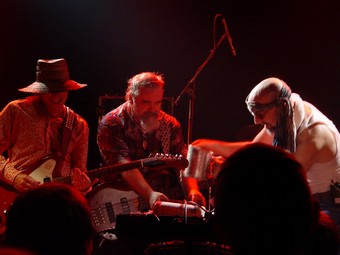
 ? - recenze vyjde v časopise Biograf
? - recenze vyjde v časopise Biograf
 se objevily informace o tom, co lze snad prý během března čekat v nové, sedmé verzi mého oblíbeného analytického programu
se objevily informace o tom, co lze snad prý během března čekat v nové, sedmé verzi mého oblíbeného analytického programu







